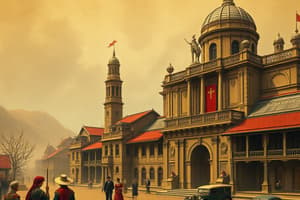Podcast
Questions and Answers
What distinguishes the Prehistoric Era from later periods in history?
What distinguishes the Prehistoric Era from later periods in history?
- It is characterized by the abundance of writing.
- It relies solely on oral traditions without evidence.
- It focuses exclusively on the study of political structures.
- It has no written records and relies on archaeological findings. (correct)
Which of the following events is primarily associated with Modern History?
Which of the following events is primarily associated with Modern History?
- The Age of Exploration. (correct)
- The spread of feudalism.
- The rise of the Roman Empire.
- The invention of writing.
What role does historiography play in the study of history?
What role does historiography play in the study of history?
- It is solely about chronological events.
- It analyzes how history is written and the methods used. (correct)
- It examines the biases of historical figures.
- It focuses on primary sources only.
In historical research, what is the importance of primary sources?
In historical research, what is the importance of primary sources?
Which challenge in history involves the loss or deterioration of records?
Which challenge in history involves the loss or deterioration of records?
How did Karl Marx influence the study of history?
How did Karl Marx influence the study of history?
Which of the following best describes the methods used in quantitative history?
Which of the following best describes the methods used in quantitative history?
What is the significance of understanding cultural heritage in the study of history?
What is the significance of understanding cultural heritage in the study of history?
Flashcards are hidden until you start studying
Study Notes
Definition of History
- The study of past events, particularly in human affairs.
- Involves the analysis of historical documents, artifacts, and other evidence.
Importance of History
- Provides context for current events and societal changes.
- Helps understand cultural heritage and identity.
- Aids in recognizing patterns and trends in human behavior.
Major Periods in History
-
Prehistoric Era
- Characterized by the absence of written records.
- Relies on archaeological findings.
-
Ancient History
- Begins with the invention of writing (around 3000 BCE).
- Includes civilizations like Mesopotamia, Egypt, Greece, and Rome.
-
Medieval History
- Spanning from the fall of the Roman Empire (5th century) to the Renaissance (15th century).
- Features feudalism, the spread of Christianity, and the Islamic Golden Age.
-
Modern History
- Encompasses the Renaissance to the present day.
- Focuses on events such as the Age of Exploration, Industrial Revolution, and World Wars.
Key Concepts in History
- Chronology: The arrangement of events in order of occurrence.
- Historiography: The study of how history is written and the methods used by historians.
- Primary Sources: Original documents or artifacts from the time period being studied.
- Secondary Sources: Analyses or interpretations of primary sources, written after the fact.
Notable Historical Figures
- Herodotus: Often called the "Father of History" for his work "Histories."
- Thucydides: Known for his account of the Peloponnesian War, emphasizing critical analysis of sources.
- Karl Marx: Influential in the development of historical materialism, linking history with socio-economic factors.
Methods of Historical Research
- Archival Research: Examination of documents and records in archives.
- Oral History: Collecting and studying historical information through interviews.
- Quantitative History: Use of statistical methods to analyze historical data.
Challenges in History
- Interpretation and bias: Historians must navigate different perspectives and biases in sources.
- Preservation: Historical records can be lost or deteriorate over time.
- Revisionism: The re-evaluation of historical events can lead to new understandings or disputes.
Conclusion
- History is vital for understanding human civilization and its complexities.
- Ongoing research and interpretation continue to shape our understanding of the past.
Definition of History
- Study of past events, focusing primarily on human affairs.
- Analysis includes historical documents, artifacts, and evidence.
Importance of History
- Provides context for contemporary events and societal transformations.
- Enhances understanding of cultural heritage and identity formation.
- Recognizes recurring patterns and trends in human behavior.
Major Periods in History
- Prehistoric Era: Distinguished by lack of written records; relies on archaeology.
- Ancient History: Starts with the invention of writing (around 3000 BCE); includes notable civilizations like Mesopotamia, Egypt, Greece, and Rome.
- Medieval History: Covers the fall of the Roman Empire (5th century) to the Renaissance (15th century); characterized by feudalism, Christianity’s spread, and the Islamic Golden Age.
- Modern History: Spans from the Renaissance to today; key events include the Age of Exploration, the Industrial Revolution, and both World Wars.
Key Concepts in History
- Chronology: Arrangement of historical events according to their occurrence.
- Historiography: Examination of how history is recorded and the methodologies of historians.
- Primary Sources: Original documents or artifacts from the studied period.
- Secondary Sources: Interpretations or analyses of primary sources created after the fact.
Notable Historical Figures
- Herodotus: Known as the "Father of History," author of "Histories."
- Thucydides: Renowned for his critical account of the Peloponnesian War.
- Karl Marx: Pioneered historical materialism, linking history with socio-economic factors.
Methods of Historical Research
- Archival Research: Investigating documents and records stored in archives.
- Oral History: Gathering historical insights through personal interviews.
- Quantitative History: Employing statistical techniques to analyze historical data.
Challenges in History
- Interpretation and Bias: Historians confront multiple perspectives and biases in historical sources.
- Preservation: Historical documents and records may be lost or deteriorate over time.
- Revisionism: Reevaluation of events can result in new insights or debates.
Conclusion
- History is essential for comprehending the complexities of human civilization.
- Ongoing research and reinterpretation are key to understanding past events.
Studying That Suits You
Use AI to generate personalized quizzes and flashcards to suit your learning preferences.




